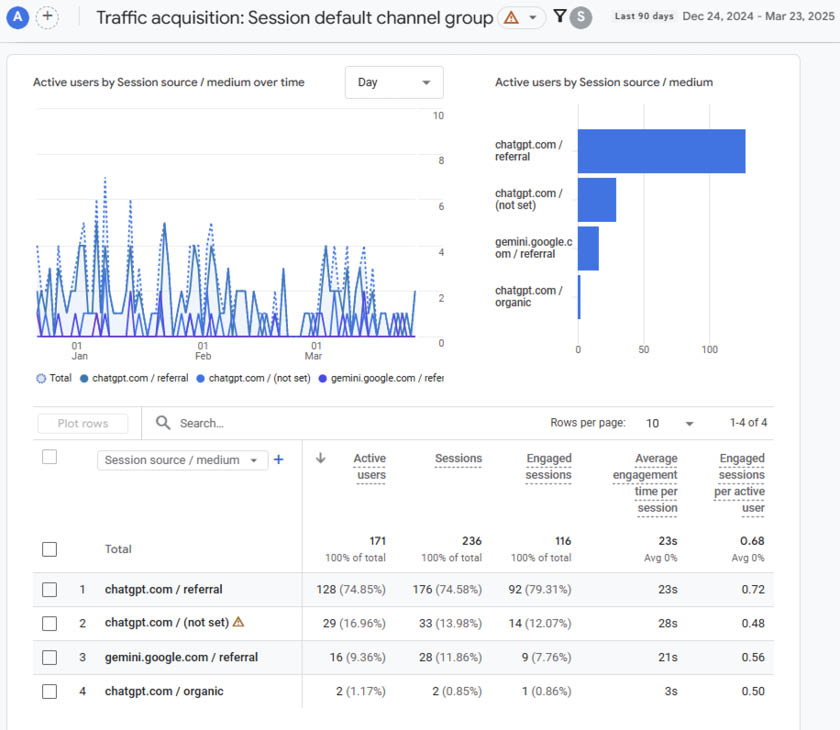Analyzing Website Traffic from ChatGPT, Gemini & AI Sources In GA4
Generative AI has taken the world by storm, fundamentally impacting how users access and search for information. Adapting and measuring success in a zero-click search environment is key to marketing success. Our experts at Blue Compass have started seeing website traffic from AI appear in Google Analytics 4 (GA4), with interesting preliminary findings. By understanding and identifying AI website traffic, marketers can gather valuable data and continue making informed decisions.
Using this early information, we gathered key insights on identifying and analyzing AI web traffic so marketers can continue to move forward in an ever-changing digital landscape.
Does AI Send Traffic To Websites?
The short answer is yes. As of July 2024, our website started to see traffic driven by AI platforms. Many AI platforms have rolled out features that now cite sources, benefiting the websites the AI tool utilized to generate its response.

Google AI Overviews and ChatGPT’s Deep Research increase their credibility by citing their sources and linking to external websites. ChatGPT’s Deep Research is built for precise and reliable research, providing fully documented, clear citations. AI assistant, Claude, has a similar feature called Citations, which provides detailed references to content it uses to generate responses. These citation capabilities are key drivers of website traffic from AI platforms.
How Much Traffic Am I Getting From AI?
Platforms like ChatGPT and Gemini are designed to keep users engaged within their ecosystems, which means they won’t drive significant AI website traffic. Google’s Gemini has gone back and forth with providing cited sources. Gemini initially rolled out an update to show citations in 2023 and then rolled back that policy in 2024 to provide citations only when directly quoting at length from a webpage. Regardless of shifting methodologies, identifying website traffic from Gemini and other AI platforms is still valuable, as it provides insights into AI-driven user behavior and helps inform decision making to refine your Generative Search Optimization (GSO) strategies .
Identifying traffic from AI sources doesn’t have to be daunting. In GA4, look at the session source/medium in your traffic acquisition report and search for a few well-known AI systems like ChatGPT, Gemini and Claude. Additionally, you can set up custom, standard or exploration reports to monitor AI-driven traffic over time, helping you better understand AI-driven behavior and trends.
How To Monitor Website Traffic From AI
Setting up GA4 reports filtered specifically for AI website traffic is the first step to identifying this segment’s volume and user interactions. We recommend creating a new default channel group in GA4 for AI in order to easily identify, monitor and set up custom reports for AI website traffic. You can use your AI custom channel group as a primary dimension in reports that already support the default channel group as a primary dimension. Creating a new channel group for AI website traffic is a helpful step in monitoring key metrics such as traffic volume, landing pages and engagement patterns to understand which content AI users are discovering and interacting with.
What We’re Noticing About Website Traffic From ChatGPT & Other Generative AI Platforms
We’ve been keeping a close eye on website traffic coming from ChatGPT and other generative AI platforms, and some interesting patterns are emerging. This traffic behaves differently compared to traditional search-driven visits, with distinct engagement trends and user intent. As these AI-powered platforms continue to evolve, we see new opportunities—and challenges—in how users discover and interact with content.
AI Website Traffic Behaves Like Non-Branded Organic Search Traffic
Metrics from AI traffic like engagement rate and average engagement time mirror what we typically see from non-branded search. Additionally, landing page traffic from AI often resembles non-branded organic search, reinforcing the idea that AI-driven discovery functions much like traditional search. Understanding these similarities can help you refine your content strategies to optimize for AI and search.
Generative AI Traffic Is Currently Categorized Under Referral
Currently, traffic from generative AI platforms is categorized under referral in GA4, making it difficult to identify and isolate from other referral sources. Since AI website traffic behaves more like organic search, creating a custom default channel group is key to separating and tracking this data independently. Creating a separate channel group allows you to get clearer insights into AI-generated traffic patterns, helping you measure AI’s impact and refine your marketing strategies more effectively.
User & Session Volume Is Low & Volatile With ChatGPT On Top
Traffic from generative AI platforms remains relatively low and highly volatile, with fluctuations from month to month. We observed our highest AI website traffic in October 2024, while January 2025 saw the lowest levels, with a drop of 18.6%. Despite these shifts, website traffic from ChatGPT consistently stands out as the largest driver of AI-generated website visits, far surpassing other platforms like Gemini and Claude. As AI adoption evolves, monitoring these trends will be key to understanding how users engage with content on AI platforms.
You Know How To Monitor Traffic From Gen AI. Now What?!
Now that you understand how to track and analyze website traffic from ChatGPT, Gemini, Claude and other AI platforms, the next step is turning these insights into action. AI website traffic may be unpredictable, but it offers valuable opportunities to refine your marketing strategy, optimize high-performing content and stay ahead of shifts in how users discover information online.
At Blue Compass, we help businesses navigate the evolving digital landscape by providing data-driven insights and SEO strategies tailored for AI-driven search. Whether you need help setting up custom GA4 reports, refining your content strategy or optimizing for AI-driven search, our experts are here to guide you. Ready to get started? Get in touch—we would love to talk about how we can partner with you.